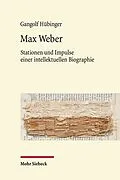Revolutionary upheaval around 1900 shaped Max Weber's realm of experience and provided significant impetus for his way of thinking. He intervened in the great conflicts of his epoch, including controversies about the "value of science" and cultural struggles on the future of Germany and Europe in the globalized world of the early twentieth century.
What defined the modern European culture Max Weber called himself a son of? Gangolf Hübinger identifies the theorisation of social thinking, the democratisation of public debate, and cultural struggles over modern ways of living as three of its most important characteristics. With early twentieth century upheavals of revolutionary proportion shaping his realm of experience and driving forward his thinking, Max Weber developed his own conceptual language and set to work on charting how knowledge on society and politics was being reordered. On the battlefield of concepts about Germany and Europe's futures, he was both an analyst and actor. The polarizing popular press, the rising tide of anti-Semitism, capitalism's clash with democratic rule - Weber tackled the great controversies of the time with his two outstanding traits of intellectual rigour and civil radicalism. The question of where typical Weberian thinking can still be found nowadays draws the volume to a close.
What defined the modern European culture Max Weber called himself a son of? Gangolf Hübinger identifies the theorisation of social thinking, the democratisation of public debate, and cultural struggles over modern ways of living as three of its most important characteristics. With early twentieth century upheavals of revolutionary proportion shaping his realm of experience and driving forward his thinking, Max Weber developed his own conceptual language and set to work on charting how knowledge on society and politics was being reordered. On the battlefield of concepts about Germany and Europe's futures, he was both an analyst and actor. The polarizing popular press, the rising tide of anti-Semitism, capitalism's clash with democratic rule - Weber tackled the great controversies of the time with his two outstanding traits of intellectual rigour and civil radicalism. The question of where typical Weberian thinking can still be found nowadays draws the volume to a close.
Titel
Max Weber
Untertitel
Stationen und Impulse einer intellektuellen Biographie
Autor
EAN
9783161575815
Format
E-Book (pdf)
Hersteller
Genre
Digitaler Kopierschutz
Adobe-DRM
Dateigrösse
2.77 MB
Anzahl Seiten
430
Lesemotiv
Unerwartete Verzögerung
Ups, ein Fehler ist aufgetreten. Bitte versuchen Sie es später noch einmal.
